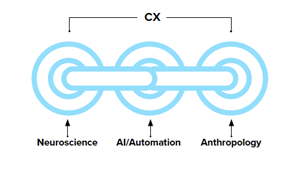There is a fundamental shift in how brands manage CX and their customers due to an explosion of technologies and more progressive organizational and operating models. The future of CX will be far different and far more powerful.
CX leaders and teams will need to update the tools, techniques and technologies they have relied for years and designed for yesterday, according to a new report, Future of CX, from Forrester.

The key drivers of change include:
• Customer-Oriented Ecosystems
Customers will design and control their own ecosystems. This will become the norm and consumers will handpick companies they trust with their data and used to filter preferences and experiences geared to them.
“A customer’s ecosystem will reflect their preferences and personal values, creating a litmus test for brands that align with those values,” Forrester said.
• The Value-Based Consumer
Consumers already pick and choose who they spend money with based on a brand’s social, moral and political beliefs. The numbers of value-based customers will continue to grow, adding pressure for brands to take sides on controversial issues.
“Firms that resort to neutrality lose appeal, since values-based consumers consider neutrality part of the problem, not part of the solution. Companies that try to play both sides or pay mere lip service will find that their strategy does more harm than good,” the report said.
Poland Spring just paired its brand characteristics with a corporate social responsibility initiative. The brand and nonprofit The Recycling Partnership are trying to help encourage recycling by launching a recycling hotline on Instagram to assist consumers wading through the confusion of what can and can’t be recycled.
• Personal Digital Twins
One of the attributes of customer ecosystems will be personal digital twins that will “front” the ecosystem, placing a protective layer between the human being and the digital world.
“PDTs will govern what elements of the customer’s identity are made available to which brand or entity and will become an invaluable tool to move from an ‘infinite’ amount of choice and associated noise to a filtered, curated set of options and opportunities tailored to the individual. The PDT, in short, governs the customer’s personal ecosystem,” according to the report.
Other articles you might enjoy:
- Mobile CX: How Burger King, Chipotle and More are Getting it Right
- ADT Brand Transformation Brings Evolution and Innovation
- An Experiential Tour is Reframed with Big Goals
• Neurosciences and Human Sciences Go Mainstream
A major dynamic informing future CX is designing to the human being, not just in the abstract but equipped with the combination of anthropology and neuroscience that enables humanly personalized experiences.
• Automation and AI
Automation and AI will fuel contextually relevant experiences regardless of delivery method (digital, physical or human). Keep an eye on how CEOs handle automation/AI and CX investments in the face of an economic slowdown.
“Some CEOs will invest mightily in automation to reduce cost. That will satisfy short-term margin goals and improve automation competency (like robotics process automation). However, it ignores the vital learning and competency building of implementing automation/AI to advance experiences that can be used to win share in low-growth markets and prepare for breakout growth as economies recover,” Forrester said.
• Creativity Back to the Forefront
Digital transformation replaced creativity with efficiencies in design and operations. Watch for creativity to make a comeback bringing a renewed vibrancy for brands.
Other key drivers include those able to harmonize physical and digital experiences and place context first will achieve significant competitive advantage, forcing others to match or better their context-driven experiences, personal tools will abound, GDPR will become the global norm, near real-time experiences will become table stakes.
Looking Ahead
Forrester says future CX programs will have elements of today’s programs, but will integrate new strategies and practices based on dramatic changes in customer behaviors; and have norms, technologies and market structures.
CX will become a core competency. Teams will have or be able to access anthropologists, neuroscience, automation/AI, ethicists, deep tech talent, deep creative talent, and robots. This will place significant demands on talent acquisition and management and leadership.
“The drivers that will affect CX are already in motion. They will gain scale and momentum—and ultimately change the way CX is led and governed and how experiences are designed and delivered,” Forrester said. “Customers make decisions based on the salience and value of experiences — and firms simply have no choice but to win at CX. Keep that strategic and financial point of view front and center so that (lack of) budgeting or political clout are not tomorrow’s reasons for CX underperformance.”



